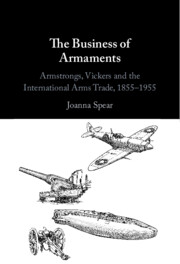Book contents
- The Business of Armaments
- The Business of Armaments
- Copyright page
- Dedication
- Contents
- Figures and Tables
- Acknowledgments
- Abbreviations
- Figures
- Introduction
- Part I Selling at Home
- 1 Armstrongs and Vickers Become Armament Firms
- 2 Selling Armaments in Britain 1860–1900
- 3 Selling Armaments in Britain 1901–1918
- 4 Selling Armaments in Britain 1919–1935
- 5 Selling Armaments in Britain 1936–1955
- Part II Selling Abroad
- Conclusions
- Bibliography
- Index
1 - Armstrongs and Vickers Become Armament Firms
The Challenges They Faced and the Strategies They Developed
from Part I - Selling at Home
Published online by Cambridge University Press: 19 January 2023
- The Business of Armaments
- The Business of Armaments
- Copyright page
- Dedication
- Contents
- Figures and Tables
- Acknowledgments
- Abbreviations
- Figures
- Introduction
- Part I Selling at Home
- 1 Armstrongs and Vickers Become Armament Firms
- 2 Selling Armaments in Britain 1860–1900
- 3 Selling Armaments in Britain 1901–1918
- 4 Selling Armaments in Britain 1919–1935
- 5 Selling Armaments in Britain 1936–1955
- Part II Selling Abroad
- Conclusions
- Bibliography
- Index
Summary
Discusses the origins of the Armstrongs and Vickers firms and their shifts into armament production. In trying to make domestic sales Armstrongs and Vickers encountered three main challenges in dealing with the British Government. First, the primacy of laissez-faire ideology within the Government, especially in the Treasury and the Foreign Office and Diplomatic Service. Second, the class prejudices of the southern elite dominating the British Government. The governing elite’s distain for trade made it difficult for armament firms to get any help, though the Admiralty and sometimes the War Office needed their products and so dealt with them. Third, departments such as the Foreign Office and Diplomatic Service were disinclined to deal with trade, preferring to focus on high politics. In response, Armstrongs and Vickers developed strategies for the domestic and international markets: building and maintaining relationships with British elites, including through exchanging personnel with the government and supplying intelligence; building and maintaining relationships with foreign elites, including using agents for diplomacy, and bribes to facilitate sales; excluding competitors from the domestic market; if exclusion failed, then cooperating and colluding with other armament firms; diversifying when sales were scarce; providing finance to secure international sales; and innovating to generate sales.
Keywords
- Type
- Chapter
- Information
- The Business of ArmamentsArmstrongs, Vickers and the International Arms Trade, 1855–1955, pp. 17 - 36Publisher: Cambridge University PressPrint publication year: 2023

